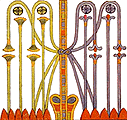
We were having a hard time, recently, getting our kids to clean their rooms and do their homework without complaining for hours and hours, so we began to search for something to help us. We've had a chart and a home store and all sorts of exciting little bobbles to motivate and enlighten them. No go. I don't even remember how it happened, though I'm sure it was some sort of revelation, but we came across the newest and greatest
tool: the power of perception. We changed their bedtime to 7:30 instead of 8:00, and we told them that if they got everything done before Daddy came home, they could "stay up late." Then, when we stay up late, we do something really fun like play games together or watch part of a show. The key is getting the "offenders" to bed early, which they really need anyway, and being involved in play for 30 minutes. And it is magic.
Reading 1 Nephi 16 and 17, I was struck by Nephi's resourcefulness while the rest of his family murmers. When Nephi's bow breaks, they all complain and sit down to die. Are they so hungry that they can't get up and figure something out? Are they sick or simply tired of it all? Why don't they:
1. Pick up the Liahona and ask the Lord what they should do or
2. Figure out some other tool to kill animals
They had just come back from a long journey, and the rest of the family had waited to them to come back with food. I can't even imagine how hungry they must have been. Exhausted and tired. But since Nephi broke his bow, they had a scapegoat, someone to blame for their troubles. Then, they seem to be blinded to their options by their anger and having someone to blame. Isn't it interesting that having someone to blame seems like a solution sometimes?
My husband and I could have said this:
"Our kids are just tired after school and we probably shouldn't expect them to get their rooms clean. We give up."
Believe me, in other areas, blaming and excuses do count as a solution of sorts.
But, going back to Nephi, when you're starving to death, you can't just ignore your problem.
Maybe the group did think to turn to the Liahona, and since they were not humble, but complaining instead, it gave them no answers.
But once Nephi was led to create a tool, and humbly ask his penitent father to turn to the Liahona, it showed them the answer. Nephi is my hero. He doesn't give up or get bitter that everyone is blaming him. Instead, he finds a tool and he takes it to the Lord. That is a powerful cure for murmuring.
The next chapter teaches us almost the same thing! When the Lord asks Nephi to build a ship, his first response is, "Lord, whither shall I go that I may find ore to molten that I may make tools to construct the ship after the manner which thou hast shown unto me?" (1 Nephi 17:9).
The first thing he asks is not, "Where do I get the wood? How do I draw the plans? " Instead, it is, "How do I make the tools?"
When we have problems, it is easy to respond as the rest of Nephi's family by asking, "Who is to blame for this? Who's going to solve it for me?" or even, "How am I supposed to get through this trial?" Sometimes, that leads us to tools. But maybe we'd get there in a more straight-forward way if we would assume we can make a difference, turn to face the trial, and find a tool. Remembering always that we must take that tool to the Lord and ask him how to use it. Because He is the master Craftsman. But remember that Nephi didn't just get to make tools. He first had to learn to build a bellows. Then, he had to find the right rock with ore in it. Then, he had to extract the ore from the rock, and FINALLY make the tools. Then, he could ask where to find the wood. Sometimes, it takes multiple tools and a long, long time to solve a problem. And some problems remain a life-long "thorn in the flesh."
That reminds me of something I learned from General Conference. In Elder Christofferson's talk, he made the point that if we are choosing as our template a perfect being, as is Christ, we should expect correction at every point of the journey. How can you aspire to build a perfect ship when you have never built ships, made tools, or even sailed before? You apprentice yourself to a great ship builder and then you
expect correction and even chastisement. The word chastise sounds harsher than correct, but are the meanings very different? We should be watching for chastisement from our master shipbuilder. What else should we expect when aspiring to perfection? How often do I pray for him to correct me rather than help me? I always want him to bless me with this or that. But he can only help me as he corrects who I am and leads me to a more perfect way.













